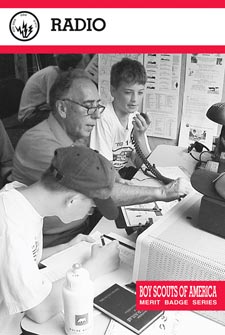- Explain what radio is. Include in your explanation: the differences between broadcast radio and hobby radio, and the differences between broadcasting and two-way communicating. Also discuss broadcast radio and amateur radio call signs and using phonetics.
- Sketch a diagram showing how radio waves travel locally and around the world. How do the broadcast radio stations, WWV and WWVH, help determine what you will hear when you listen to a radio?
- Do the following:
- Draw a chart of the electromagnetic spectrum covering 100 kilohertz (kHz) to 1000 megahertz (MHz).
- Label the LF, MF, VHF, UHF, and microwave portions of the spectrum on your diagram.
- Locate on your chart at least eight radio services such as AM and FM commercial broadcast, CB, television, amateur radio (at least four ham radio bands), and police.
- Discuss why some radio stations are called DX and others are called local. Explain who the FCC and ITU are.
- Explain how radio waves carry information. Include in your explanation: transceiver, transmitter, amplifier, and antenna.
- Learn the safety precautions for working with radio gear, particularly DC and RF grounding.
- Do the following:
- Explain the differences between a block diagram and a schematic diagram.
- Draw a block diagram that includes a transceiver, amplifier, microphone, antenna, and feedline.
- Explain the differences between an open circuit, a closed circuit, and a short circuit.
- Draw eight schematic symbols. Explain what three of the represented parts do. Find three electrical components to match to three of these symbols.
- Do ONE of the following: (a, b, or c )
- Amateur radio
- Describe some of the activities that amateur radio operators can do on the air, once they have earned an amateur radio license.
- Carry on a 10 minute real or simulated radio contact using voice or Morse Code; use proper call signs, Q signals, and abbreviations. (Licensed ham radio operators may substitute five QSL cards as evidence of contacts with amateur radio operators from at least three different call districts.) Properly log the real or simulated ham radio contact and record the signal report.
- Explain at least five Q signals or amateur radio terms you hear while listening.
- Explain some of the Technician Class license requirements and privileges. Explain who gives amateur radio exams.
- Explain how you would make an emergency call on voice or Morse code. Tell why the FCC has an amateur radio service.
- Explain handheld transceivers versus home "base" stations. Explain about mobile amateur radios and amateur radio repeaters.
-
Broadcast radio
- Prepare a program schedule for radio station "KBSA" of exactly one-half hour, including music, news, commercials, and proper station identification. Record your program on audio tape using proper techniques.
- Listen to and properly log 15 broadcast stations; determine for five of these their transmitting power and general areas served.
- Explain at least eight terms used in commercial broadcasting, such as segue, cut, and fade.
- Discuss the educational and licensing requirements and career opportunities in broadcast radio.
-
Short-wave listening
- Listen across several short-wave bands for two 4-hour periods, one in the early morning and the other in the early evening. Log the stations properly and locate them geographically on a globe.
- For several major foreign stations (BBC in Great Britain or HCJB in Ecuador, for example), list several frequency bands used by each.
- Compare your morning and evening logs, noting the frequencies on which your major foreign stations were loudest during each session. Explain the differences in signal strength from one period to the next.
- Discuss the purpose of and careers in short-wave communications.
- Amateur radio
- Visit a radio installation approved in advance by your counselor (ham radio station, broadcast station, or public service communications center, for example). Discuss what types of equipment you saw in use, how it was used, what types of license are required to operate and maintain the equipment, and the purpose of the station.
BSA Advancement ID#:
93
Requirements last updated in:
2002
Pamphlet Publication Number:
00000
Pamphlet Stock (SKU) Number:
33361A
Pamphlet Revision Date:
2001
| Worksheets for use in working on these requirements: | Format | |
|---|---|---|
| Word Format | PDF Format | |
Page updated on: May 08, 2022









